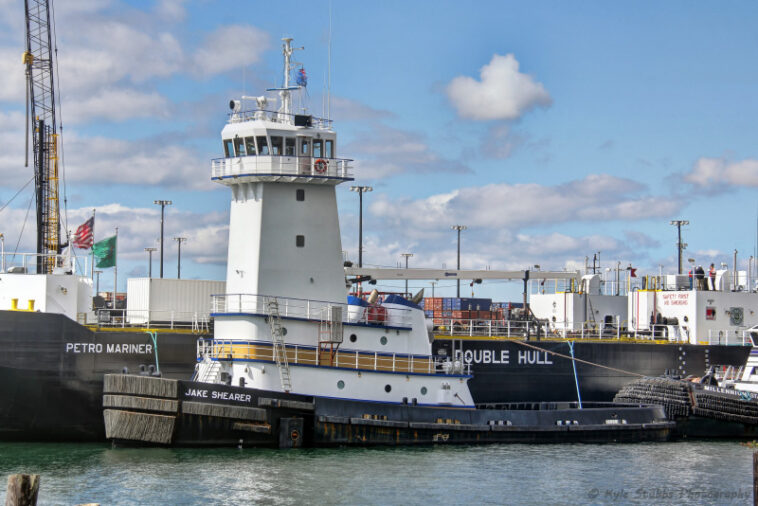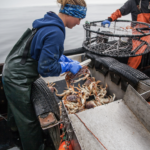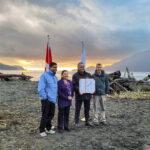Do you remember the Jake Shearer tugboat incident of 2017? For most British Columbians, the answer is likely ‘no.’ That’s because a spill of millions of litres of fuel was averted thanks to the quick action of Heiltsuk Coastal Guardians. This November marks the six-year anniversary of the narrowly-avoided environmental disaster that still serves as a warning today, with the ever-increasing oil and gas traffic on BC’s coast.
On November 26, 2017, Marilyn Slett, Chief Councilor of the Heiltsuk Council and then-President of Coastal First Nations, posted an emergency notice to Facebook. The American-owned tug, Jake Shearer, was towing a barge carrying 12.4 million litres of fuel, and “in distress in Heiltsuk waters about two nautical miles south of Goose Island” near Bella Bella. The tug had been caught in stormy waters and became loose from its fuel barge.
“Sickening feeling thinking about the current situation, not if, but when, again!! #JakeShearer.”
William Housty, Heiltsuk Integrated Resource Management Department (HIRMD)
Thankfully, the crew members were able to drop anchor, and the Heilstuk Guardians were soon on site to prevent any fuel release. If the conditions had worsened, the over 12 million litres of diesel and gasoline would have been dumped into a crucial Heiltsuk harvesting site.
Heiltsuk leaders took to social media to express their concerns at the time. William Housty of the Heiltsuk Integrated Resource Management Department (HIRMD) posted, “Sickening feeling thinking about the current situation, not if, but when, again!! #JakeShearer.” Slett posted that the incident “highlights the desperate need for Indigenous-led response capacity on the central coast,” which included renewed calls for a proposed Indigenous Marine Response Centre.
Nathan E. Stewart Spill
The catastrophe prevented with the Jake Shearer resurfaced concerns about inadequate marine response that arose after another tug caused a serious oil spill the year before. In 2016, The Nathan E. Stewart tugboat sank in Heiltsuk waters, releasing 110,000 litres of diesel, heavy oil, and pollutants into Gale Creek – an essential harvesting and cultural site for the Heiltsuk.
Governmental marine response was heavily criticized because the Coast Guard took three hours to notify the Heiltsuk and 17 hours for a Transport Canada-certified response team to arrive. Heiltsuk community members were left scrambling to respond to the massive oil spill, which has since significantly impacted their ecosystem and food security.
“There’s a big loss of resources out here. We got the urchins here, the clam beds here, there’s even a little fish in here too … It’s taken a big hit on our community,” said Marvin Brown, Heilstuk fisherman, in a video from 2017, reflecting on the Nathan E. Stewart incident. He explained his loss of livelihood: “It’s going to affect my kids; it’s going to be a big loss for years to come.”
Changes in Marine Response
In October 2022, the federal government finally responded to the Heiltsuk Nation’s calls for additional resources to bolster its marine response capacity. Transport Canada agreed to give $5 million to the Heiltsuk to create a marine emergency response team that would act as a third-party responder. As part of Canada’s Oceans Protections Plan, the response project set out to “include engaging with community members, on-water exercises and training, procuring equipment, and developing response strategies within the Heiltsuk territory.” Funding helped them purchase more equipment like booms, skimmers, and absorbents that would allow the emergency response team to act quickly in the event of a spill.
“What we’ve experienced from Nathan E. Stewart, we would never want to see that happen to anyone on the coast.”
Harvey Humchitt, Hereditary Chief of the Heiltsuk Nation
The Heiltsuk Nation has also since formed Heiltsuk Horizon, a partnership with Horizon Maritime, a Canadian company specializing in marine operations, to advance plans for a forthcoming Indigenous Marine Response Centre. “Heiltsuk have always relied on the ocean,” Hereditary Chief Harvey Humchitt told The Narwhal in 2021. “What we’ve experienced from Nathan E. Stewart, we would never want to see that happen to anyone on the coast.”
Spill Warnings
There are serious lessons to be taken away from the Nathan E. Stewart and Jake Shearer tugboat incidents for all of BC’s coastal communities, now more than ever. The expansion of the Trans Mountain pipeline is expected to increase tanker traffic in BC waters from 60 tankers per year to 400 per year. Coastal communities like Sooke and Metchosin are demanding their city councillors support a tanker ban in rough waters to prevent catastrophic oil spills.
“We need to think of this as hišuk ma c̕awak [the belief that all is connected] because whatever is going to happen is going to impact a lot of things. We need to be the eyes, the monitors.”
Archie Little, Nuchatlaht councillor
Indigenous communities, like the Nuchatlaht First Nation, are criticizing the weak governmental oversight of increased tanker traffic and bracing themselves for inevitable accidents. “We have to understand that when we have a spill, it’s going to impact other resources,” said Archie Little, Nuchatlaht councillor, talking to the Ha-Shilth-Sa about Trans Mountain’s tankers. “We need to think of this as hišuk ma c̕awak [the belief that all is connected] because whatever is going to happen is going to impact a lot of things. We need to be the eyes, the monitors.”






